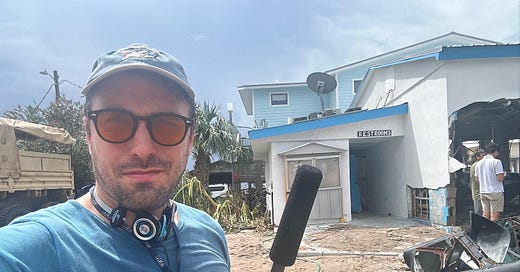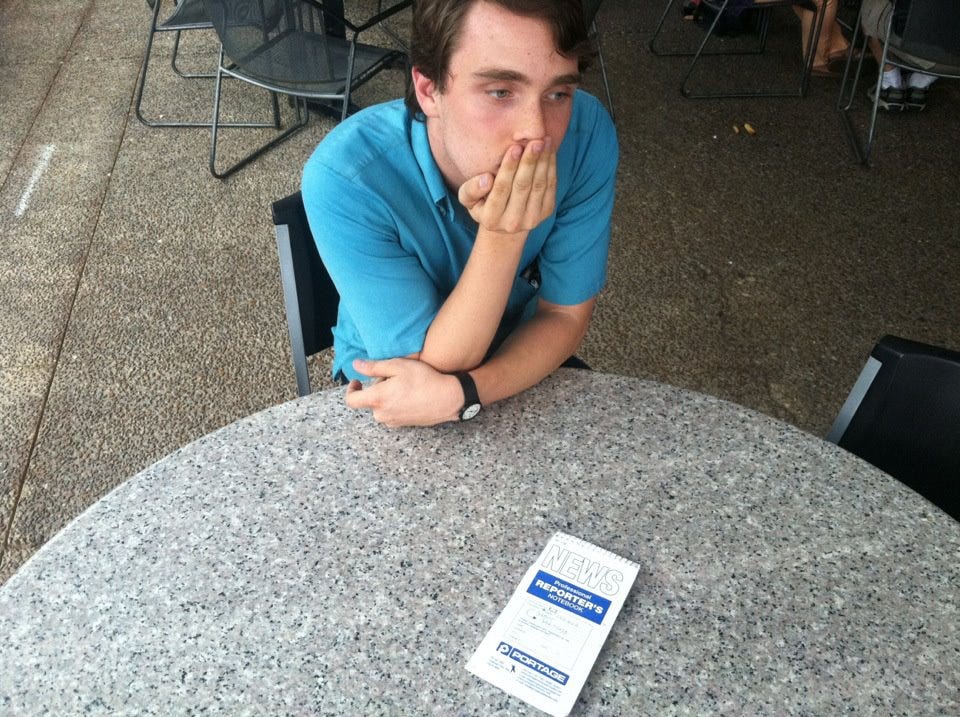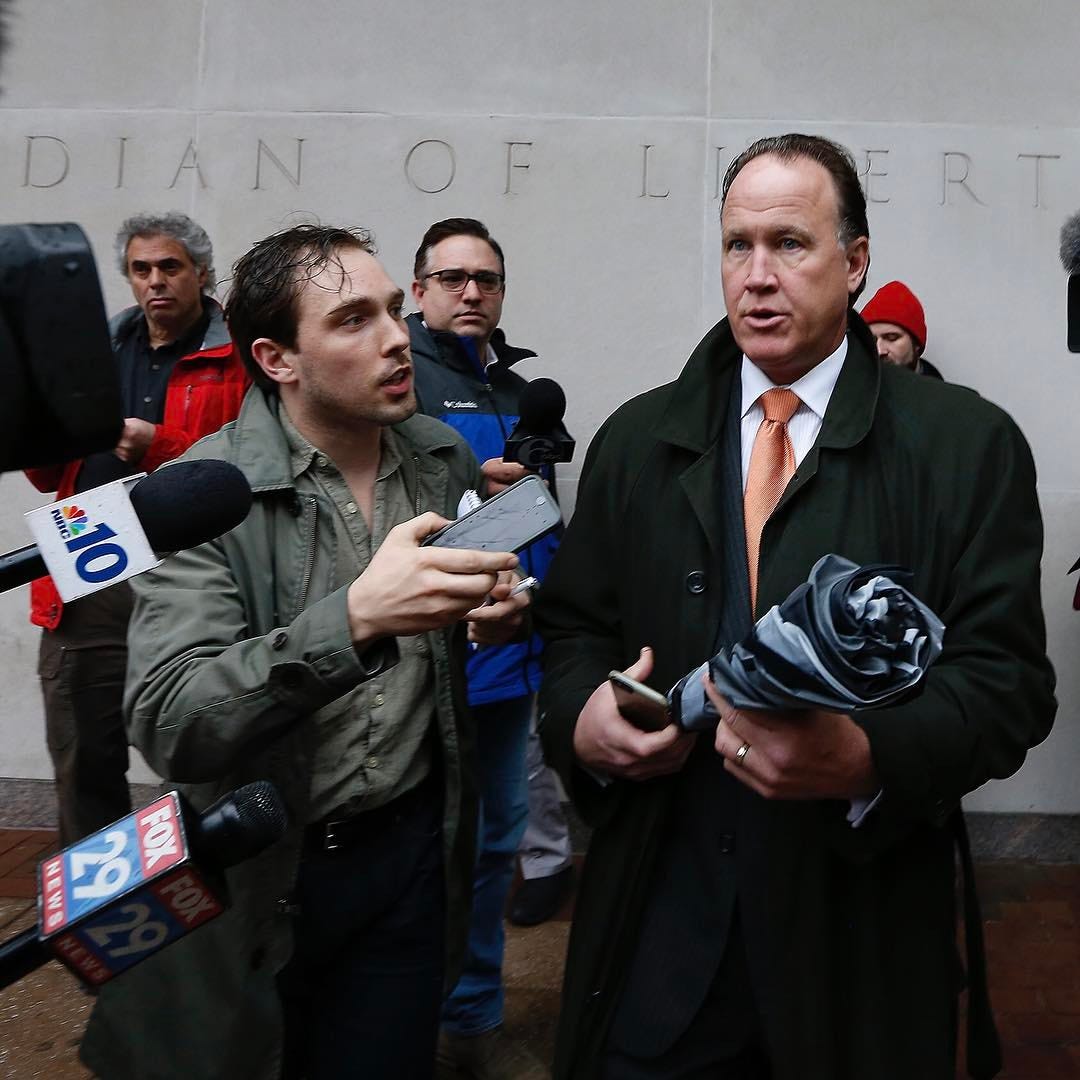After four years as a reporter at NPR, I've been promoted to correspondent.
Amid the steady downward drumbeat of industry news, it feels weird to celebrate a promotion. But given my biography, becoming an NPR Correspondent verges on an instance of religious grace.
Admittedly, writing about a career milestone is something of a brag. But it feels like the right moment to reflect on where I came from and how far I've come. Not many people know about my working-class background, even though it is the very foundation of who I am.
I was raised by my grandparents in Plymouth, Pennsylvania, a small former coal mining town where the typical household makes $40,000 a year and it’s not uncommon to meet someone whose family has been on the same block for generations. It’s considered “the wrong side of the tracks” even by the scrappy standards of the Wilkes-Barre-Scranton area.
It’s situated in Luzerne County, a once-thriving but now deindustrialized swath of northeastern Pennsylvania tucked in the Pocono Mountains. It twice voted for Obama, then, in 2016, decisively voted for Trump, becoming a popular destination for fly-in national reporters attempting to humanize Trump’s working-class base. Ben Bradlee, Jr. wrote the book “The Forgotten: How the People of One Pennsylvania County Elected Donald Trump and Changed America.” It was about Wilkes-Barre.
Growing up, NPR barely existed there. It was mostly classical music, with a smattering of news programs. When I’d listen to NPR’s programs, I’d imagine myself being on air one day, reciting my reporterly sign-off in the shower to my grandparents' bewilderment. They never put NPR on the dial. They preferred Creedence Clearwater Revival and Elton John.
My biological parents were never in the picture. My father was incarcerated shortly after I was born, and my biological mother was plagued with acute mental health issues. My grandparents adopted me when I was six months old.
I grew up BMX biking, playing Magic the Gathering, going to shows in the local hardcore punk scene and, curiously enough, always wanting to be a journalist. It seemed like a profession that rewarded those with psychotic persistence who liked to push buttons.
In high school, my journalism teacher Mr. Nicholas and I threatened to sue the school over its attempt to shut down student interviews I was conducting on the concourse. The school backed off. There was something about my punk spirit that relished challenging authority in the name of journalism.
My grandfather was a factory worker and my grandmother was a receptionist. Both were supportive and adoring parents, though they knew precious little about the world of journalism. The only writer they knew was the person who put together our Protestant church bulletins. Checking out the path of my peers in other places, it seemed like most aspiring journalists got a leg up doing unpaid internships with parental subsidies to boot.
That wasn’t possible, but I became resourceful.
When I became the first in my family to attend college, I did a bunch of internships, but always supported myself, delivering food on a box-truck in Manhattan when not writing newspaper articles, or working as a live-in nanny in Washington when I wasn’t a magazine fact-checker on Capitol Hill.
When I had my first byline in the New York Times, at age 20, my grandparents couldn’t see it in print, since spotting the paper in the wild in Wilkes-Barre was like spotting a golden lion in the Amazon rainforest.
I got so used to making a living from everything but journalism that when I started to make money from reporting, it felt like I had somehow tricked the universe.
My career has been beset with self-doubt. I never thought I’d get a full-time job in journalism. Then, after nearly a decade as a local journalist, I never thought I’d land a national gig. I suppose it’s awkward to invoke the cliché that journalism is not a meritocracy in a post about my promotion to correspondent, but a twisty and improbable set of factors led me to this point, and it would be nearly impossible for someone to try to replicate it. But my working-class background has driven my forward.
Growing up with less than those around me always gave me a chip on my shoulder. In small ways: Out of shame, I hid from my peers the purple tickets I took to middle school to get my free lunch. And in bigger ways as I got older, like resenting my peers whose parents had connections and mentors to jumpstart their journalism careers.
Being a reporter used to be a blue-collar occupation, a kind of fact-fetching tradesman, where the door-knockers with the most gumption and drive got the best pay. Had I entered journalism half-a-century earlier, when I wouldn’t be vying for career success against young journalist upstarts with Ivy League pedigrees and families with boundless resources, perhaps I’d be more comfortable, but maybe I’d be less motivated to prove something, too.
Pluckiness can lead to bad outcomes, but it can also help you land a story. I’m reminded of my first-ever frontpage byline at my first newspaper job at the Oregonian in Portland.
I had to rush to the scene of a man who crashed a single-engine airplane into a home in Aurora, Oregon, a half-hour south of Portland. Vehicles couldn’t get within a half mile of the wreckage, but thankfully, I had my cross-country running shoes on. While I never had much money growing up, I was known for having a pretty impressive mile time. Naturally, I sprinted to the crash site and caught the pilot, alive, on the roof of the house being transported into am ambulance.
He wasn’t able to speak (I tried to talk to him), but I interviewed a handful of neighbors just in time to make the paper’s print deadline.
Barely.
When I got back to the newsroom, my editor, Tom Wolfe, not the famous white-suited one, but a different kind of gifted wordsmith nonetheless, was literally breathing down my neck. “Where’s the copy?” He asked, growing increasingly agitated, since we had already blown through a hard-fast print deadline.
Anxiety-ridden and literally shaking from nerves, I smashed together the reporting I had and filed it. I told Tom. He didn’t say anything.
Like a surgeon under the gun, he nipped and tucked and sent the story to the paper’s designers to be printed the next day.
As he left the newsroom, he stopped in the doorway and looked back at me.
“Bobby,” he said. “Congratulations on your first A1 story,” and he left without saying goodbye.
The rush of achievement in journalism can fade away fast. A promotion comes, then deadlines start encroaching. Time for reflection is the casualty.
My grandfather used to say, “Bob, just don’t work in a factory like I do,” setting a pretty low watermark for my professional success, but I still appreciated it.
If he and my grandmother were alive, they’d be excited for me and tell everyone in the Wilkes-Barre area that I’m now an NPR correspondent. Most would likely respond: “what’s NPR?”






Lovely essay. Your grandparents would be incredibly proud. Thanks for sharing... and congratulations!
Mazel tov Bobby. As usual, this is a very nice piece of writing. Looking forward to hearing you.